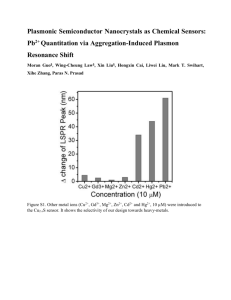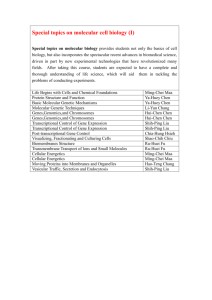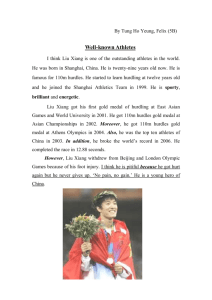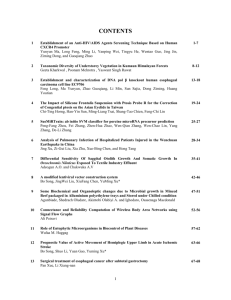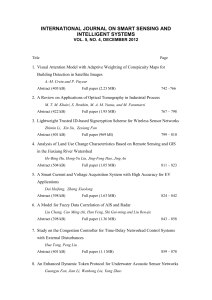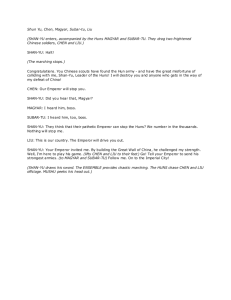Y(4260)
advertisement
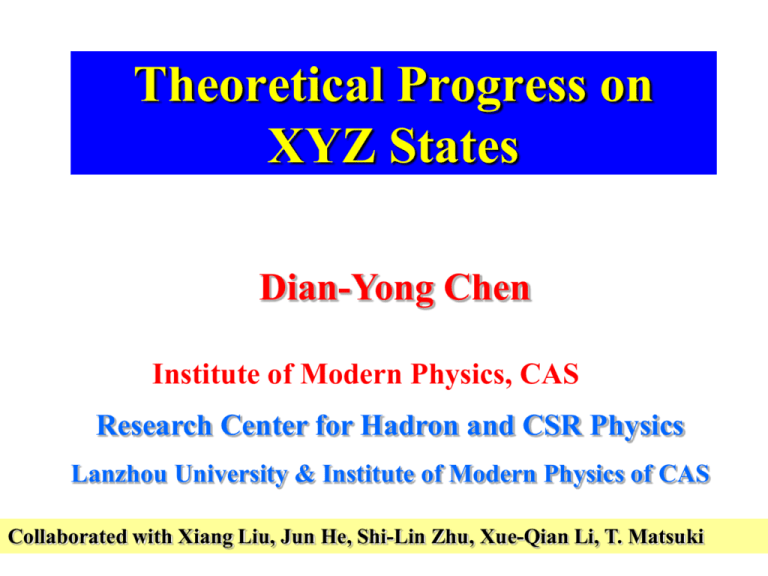
Theoretical Progress on XYZ States Dian-Yong Chen Institute of Modern Physics, CAS Research Center for Hadron and CSR Physics Lanzhou University & Institute of Modern Physics of CAS Collaborated with Xiang Liu, Jun He, Shi-Lin Zhu, Xue-Qian Li, T. Matsuki Outline • Charmonium-like state Y(4260) Y(4360) • Y(5S) hidden-bottom dipion decays Zb(10610) Zb(10650) • Summary 2 Charmonium-like states Y(4260) and Y(4360) Dian-Yong Chen, Jun He and Xiang Liu PRD83, 074012 (2011) PRD83, 054021 (2011) 3 According to the production mechanism, we can categorize these charmonium-like states X, Y, Z as four groups: ISR process Y(4260) Y(4008) Y(4360) Y(4630) Y(4660) 4 Experimental status of Y(4260) and Y(4360) PRL95, 142001 (2005) Y(4260) Spin-parity: J PC =1 -- 5 Y(4360) Spin-parity: PRL98, 212001 (2007) J PC =1 -- PRL99, 142002 (2007) M=4324±24 MeV M=4361±9±9 MeV Γ=172±33 MeV Γ=74±15±10 MeV 6 Theoretical explanation Exotic state: • Charmonium hybrid Y(4260) Zhu, Kou&Pene, Close&Page • Diquark-antidiquark state [cs][cs] Maiani&Riquer&Piccinini&Polosa, Ebert& Faustov & Galkin • Molecular state ( ) Liu&Zeng&Li, Yuan&Wang&Mo, Qiao, Ding, Torres&Khemchandani &Gamermann&Oset, Close&Downum&Thomas • Charmonium hybrid state with strong coupling with DD1 and D D0 Kalashnikova &Nefediev The lack of signal in certain channels also poses a serious challenge to a number of the explanations proposed in the framework of an exotic state. 7 Conventional charmonium: Y(4260) • 4S-3D vector charmonium Llanes-Estrada 3 • 2 D1 state decay behavior Eichten, Lane, Quigg • Mass spectrum Y(4260) ≠charmonium Segovia, Yasser, Entem, Fernandez • Screened potential Y(4260) =Ψ(4S) Li, Chao 8 Conventional + exotic Y(4360) • 3D charmonium or charmonium hybrid Ding, Li&Chao • The radial excited state of Y(4260) Qiao • Charmed baryonium Cotugno&Faccini&Polosa&Sabelli • The vector hybrid charmonium with strong coupling with D*D0 Kalashnikova&Nefediev • molecular state Albuquerque & Nielsen • Close&Downum&Thomas 9 Y(4260) Y(4360) ψ(4040) ψ(4160) D*D* DD ? PRL100,062001(2008) DDπ arXiv:0908.0231 DD*π Λc+Λc– Y(4660) Y(4660) DD* PRD77,011103(2008) PRL101,172001(2008) if Ruds=2.285±0.03 PRL98, 092001 (2007) ψ(4415) ψ y (4415) Y(4260) Y(4325) Y(4360) y (4160) ψ(4160) ψ (4040) y Y(4008) ψ (3770) y R(s) = σ(e+e–→hadrons)/σ(e+e–→μ+μ–) – Ruds Y(4008) The main challenge of Y(4260) and Y(4360) as a conventional charmonium: No evidence of Y(4260)/Y(4360) in the obtained open-charm process and R-value scan Durham Data Base 10 Non-resonant explanation for Y(4260) and Y(4360) The interference between Continuum and Resonance 11 Background Y(4360) Y(4260) 12 Can we reproduce the line shape of Y(4260) and Y(4360) in our model? Five fitting parameters: 13 Numerical results for Y(4260) D.Y. Chen, J. He and Xiang Liu, Phys.Rev.D83, 054021 (2011) Y(4260) Y(4008) M=4008±40 MeV Г=226 ±44 MeV Belle, Phys.Rev.Lett.99:182004 (2007) 14 Numerical results for Y(4360) Dian-Yong Chen, Jun He and Xiang Liu PRD83, 074012 (2011) 15 Y(5S) hidden-bottom dipion decays Zb(10610) and Zb(10650) Dian-Yong Chen, Jun He, Xun-Qian. Li, Xiang Liu, PRD84, 074006 (2011) Dian-Yong Chen, Xiang Liu, Shi-Lin Zhu, PRD84, 034002 (2011) Dian-Yong Chen, Xiang Liu, PRD84, 094003 (2011) Dian-Yong Chen, Xiang Liu, PRD84, 034032 (2011) Dian-Yong Chen, Xiang Liu, Takayuki. Matsuki, PRD84, 074032 (2011) Dian-Yong Chen, Xiang Liu, Takayuki. Matsuki, preparing 16 Dipion hidden-bottom decays of Y(5S) Belle, PRL100, 112001 Decay channel MeV Y(5S)Y(1S)π+π- 0.59 Y(5S)Y(2S) π+π- 0.85 Y(5S)Y(3S) π+π- 0.52 Y(2S)Y(1S) π+π- 0.006 Y(3S)Y(1S) π+π- 0.0009 Y(4S)Y(1S) π+π- 0.0019 Belle, PRD82, 091106(R) (2010) 102 Puzzle existing in Y(5S) dipion hidden-bottom decays 17 Explanations of anomalous branching ratios of Y(5S) hidden-bottom dipion decays • Rescattering mechanism C. Meng, K.T. Chao PRD77, 074003 (2008) PRD78, 034022 (2008) PRD78, 074001 (2008) Yu. A. Simonov JETP Lett. 87, 147 (2008) H.W. Ke, Xiang Liu, X.Q. Li PRD82, 054030 (2010) • Bottom analogue of Y(4260) s. Godfrey, S.L. Olsen arXiv:0801.3867 • Exotic structure-Tetraquark state near Y(5S) M. Karliner, H.J. Lipkin arXiv:0802.0649 A. Ali et al. PLB684, 28 (2010), PRL104, 162001 (2010) 18 Ali et al., PRL104, 162001 Chen, He, Li, Liu, PRD84, 074006 (2011) Tetraquark explanation to Y(10870) Indicate the mistake in Ali’s work Propose interference effect New puzzle! 19 Experiment status of two charged Zb Belle Collaboration arXiv:1105.4583 Zb(10610) Zb(10650) 20 Zb structues and new puzzle Chen, Liu, Zhu, PRD84, 054002 (2011) Two newly observed Zb structures play important role to solve “new puzzle” in Y(5S)Y(2S)π+π- decay Question: what is the source to generate Zb(10610) and Zb(10650)? 21 Theoretical explanation I- Exotic strucutes • S-wave BB* and B*B* molecular states Liu, Xiang Liu,Deng, Zhu, EPJC56, 63 (2008) Xiang Liu, Luo, Liu, Zhu, EPJC61, 411 (2009) Predict BB* molecular state Bondar, Garmash, Milstein, Mizuk, Voloshin, arXvi:1105.4473 Zhang, Huang, arXiv:1105.5472 QCD sum rule Voloshin, arXiv:1105.5829 Radiative decays Cleven, Guo, Hanhart, Meissner, EPJA, 47, 120 (2011) Sun, He, Xiang Liu, Luo, Zhu, PRD84:054002,2011 One-Boson-Exchange model • Tetraquark state Yang, Ping, Deng, Zong, arXiv:1105.5935 Guo, Cao, Zhou, Chen, arXiv:1106.2284 22 Theoretical explanation II- Mechanism • D. V. Bugg, EPL96, 11002 (2011) Cusp effect • Yu. A. Simonov, arXiv: 1106.1522 •Dian-Yong Chen, Xiang Liu, PRD84, 094003 (2011) Initial single pion emission (ISPE) mechanism An underlying mechanism without introducing exotic explanation! 23 BB* B*B* Exp BB 24 BB* B*B* BB 25 More predictions Dian-Yong Chen, Xiang Liu, PRD84, 034032 (2011) If the ISPE mechanism is a universal mechanism in heavy quarkonium dipion decays, we naturally extend the ISPE mechanism to study the hidden-charm dipion decays of higher charmonia or higher bottomonia 26 Dian-Yong Chen, Xiang Liu, Takayuki. Matsuki, PRD84, 074032 (2011) Predicted charged bottomonium-like structures near BB* and B*B* threshold. Belle II and SuperB 27 BESIII Belle&BaBar Belle II 28 Dian-Yong Chen, Xiang Liu, Phys. Rev. D84, 034032 (2011) CLEO-c, PRL107, 041803 (2011) e e hc @ 4170 MeV e e J / @ 4260 MeV 29 ISPE Mechanism Bottomonium Charmonium PRD74,091103(R) (2006) Strangeonium PRL100,102003 (2008) BES-II M=2.175 GeV Γ= 58 MeV A series in flavor: M=2.186 GeV Γ= 65 MeV Y (2175) (1860) • Similar novel peak structures • K*K : Sharp & Narrow K*K* : Smooth& Broad • More Experimental Measurements (BESIII) 31 Summary • Non-resonant explanation to Y(4260) and Y(4360) • Charged Zb(10610) and Zb(10650) Mechanism:ISPE mechanism Extend to Charmonium, Strangeonium • More efforts theory+experiment Belle-II, BESIII, LHCb, SuperB, PANDA 32 Thank you ! 33 A series in flavor: ISPE Mechanism Bottomonium Charmonium Strangeonium 34 PRD74,091103(R) (2006) PRL100,102003 (2008) BES-II M=2.186 GeV Γ= 65 MeV M=2.175 GeV Γ= 58 MeV Summary of Mass of width Process M(GeV) Γ(MeV) BaBar(2006) e e f 0 (980) 2.175 58 BES-II(2008) J / f 0 (980) 2.186 65 2.127 60 2.079 192 Belle(2009) Belle(2009) BES-II e e e e *0 J / K K *0 35 No Evidence of Y(2175)
